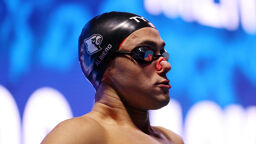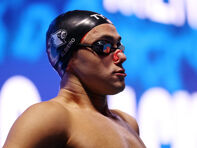For 19 years I never thought I would be able to proudly say what I’m about to say now. I’m Gay.
I was constantly surrounded by the notion that being gay was a bad thing as a child and into my teenage years. My hometown of about 1,500 people wasn’t the most accepting place to grow up in if you didn’t meet certain expectations or give in to small-town politics. The idea of anyone coming out at Platte Valley High School in Kersey, Colo., was something completely unheard of, especially if they were a student-athlete.
I think certain K-12 classmates of mine always suspected that I was different from a young age. It wasn’t because I was “flamboyant,” but for years I was the only person in my graduating class of about 80 students who swam competitively year-round.
On consistent occasions, people used this as an outlet for insults since they viewed swimming as a stereotypical “gay” sport. There was a prolonged period throughout my teenage years where homophobic slurs were being thrown at me daily, and it was solely because I was a swimmer.
The bullying at my school had me so fed up that at one point I lied and told people that I had quit the sport in order to make the insults stop. I was frustrated that I felt the need to do something like that to feel happy while continuing to do what I loved.
It was ridiculous that people disrespected my swimming just because it wasn’t typical at my school, and it was even more unacceptable that they insulted it by being homophobic.
All of this happened before I knew or fully understood that I actually was gay.
As I started developing certain feelings, my first instinct was to suppress and ignore them. The direct insults toward me stopped as my classmates matured, but the type of judgmental environment that I was still in everyday forced me deep into the closet.
I was still surrounded by people at school and on my high school team who turned to homophobic insults to describe almost everything they found unappealing in the slightest way. Not standing up to them will always be one of my biggest regrets.
I developed depression and crippling anxiety at age 14. I was confused at what was happening to me, considering multiple aspects of my life had been great until I reached that age. My schoolwork had been going well and I had just won three Colorado state swimming titles.
‘No one should ever believe even for one second that their life doesn’t matter.’
Nothing made sense, and I convinced myself that I was an idiot because of it. I was angry and sad. My relationships with people suffered.
The darkest moments of my life came when I laid in bed at night and asked God to take my life because of the amount of self-hatred I felt towards myself. This continued off and on all the way through my freshman year of college.
My swimming suffered immensely at times. But even though I wasn’t always excelling at the sport or performing up to my fullest athletic potential, it was the only thing that kept me grounded.
I kept my struggles with mental illness a secret until tragedy struck my family when I lost a cousin (who was more of an older sister to me) to suicide. When she passed away, there was part of me that went with her. As tragic as her death was, it made me realize how much value life holds.
No one should ever believe even for one second that their life doesn’t matter.

I communicated my struggles to my mother and began attending therapy shortly after my cousin’s death, but the battle of acknowledging my own sexuality was still very present.
One day my therapist directly asked if I was struggling with my sexual identity. Still terrified at the possibility of myself being gay, I simply shrugged off the question by saying no. I was in denial about who I was and it had clearly been taking a severe toll on me.
I pushed myself to take steps to accept myself. I finally reached a point where I could acknowledge that I was gay, but that didn’t necessarily mean I was comfortable with people knowing about it. By the time I was nearing the end of the college recruiting process, I knew I wouldn’t be able to come out anytime soon.
Not long after I had scheduled one of my official visits to the University of South Dakota, I coincidentally stumbled along a “You Can Play” YouTube video that multiple USD athletes, coaches, and administrators had created.
I was careful not to get my hopes up too high after watching the video. I didn’t want to make my college choice solely based off of it, and I didn’t want my expectations to be too high just in case my official visit didn’t go well. Still, I was thrilled to see that a Division I University in the rural Midwest was so progressive in promoting equal playing opportunities for all their student-athletes.
‘One of the main reasons why I chose South Dakota was because I knew that I would be able to grow into the person that I wanted to be.’
I discovered that there were both present and former gay athletes who had shown success as they made their way through the USD program. I knew that if they had been able to live openly and be successful, that there was a chance that I could too.
One of the main reasons why I chose South Dakota was because I knew that I would be able to grow into the person that I wanted to be.
I slowly came out to close teammates throughout my freshman year while others found out through other ways (even though that part wasn’t my choice). Luckily, I knew they would be accepting whether I was the one telling them or not.
My head coach was the first “adult” I ever told. We sat down on the bleachers at the pool during finals week and, as casual as it was, what he responded with was one of the most uplifting things that anyone has ever told me.
“Well, that’s okay,” he said lightheartedly. “Just as long as you invite my wife and me to your wedding someday.”
That gave me a lot of confidence throughout my entire coming out process.
Without that huge weight on my shoulders, I can now concentrate on being the best student, swimmer, friend, teammate, and person that I can be.
I wish I hadn’t ever let anyone make me think that I should be ashamed of my sport, or that I should be ashamed of who I am. Even with all of the doubters I’ve come across, I’ve found that I can still proudly love and embrace who I am regardless of what anyone else has to say.
My biggest hope is that others can too.
Bryce Fehringer swims for the Univ. of South Dakota. You can find him on Twitter @FehringerBryce or Instagram @FehringerB. You can also email him at [email protected].







































